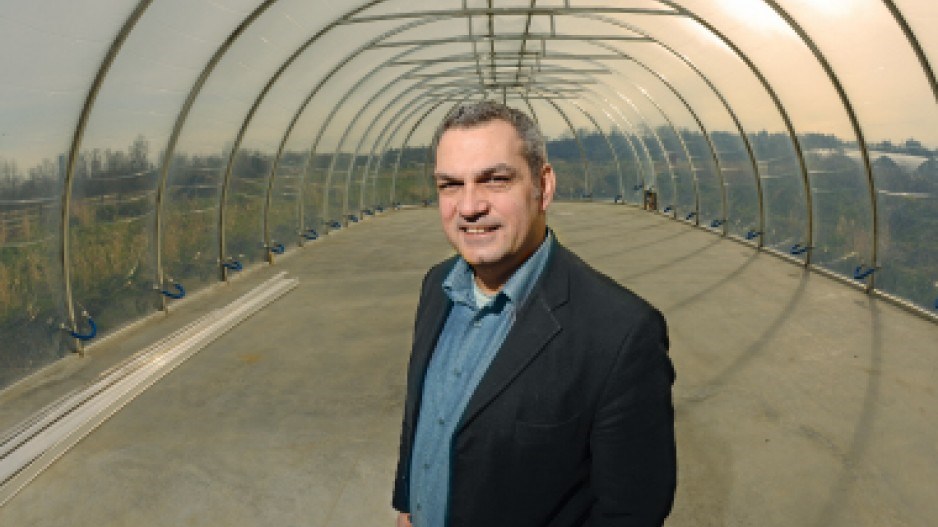A B.C. startup wants to change the way you eat your vegetables – and the way local farmers grow them.
Instead of importing produce grown in California and Mexico, Surrey-based NuAgri wants to encourage sustainably grown organic produce farmed right here in its high-tech greenhouses. It has started construction of its first in Surrey.
"The majority of [produce] that restaurants and consumers use here doesn't come from here," said Chris Gielnik, president and CEO of NuAgri. "At least 85% to 90% of [it] comes from the U.S. or Mexico or somewhere else."
As Gielnik explained, importing has a profound effect on food quality.
"Food today is designed to travel – it's not designed to be consumed," said Gielnik. "The majority of the food that arrives in the supermarket has already lost over 40% of its nutritional value."
NuAgri's solution: build a high-tech urban growing environment that makes centralized agribusiness obsolete.
"We're talking about growing food where it's going to be consumed," Gielnik said. From his perspective, even the famous 100-mile diet is much too inefficient.
"One hundred miles is a long way. We think we can grow really good food within five miles. Or we could put one of these units on top of a building, and it could be around the corner from where it's going to be consumed."
NuAgri has focused its efforts on three core technologies:
- the company's "bio-dome" greenhouses that use non-petroleum ETFE plastic for their walls and roofs. The recyclable material offers better insulation and light penetration and a longer lifespan than traditional materials;
- NuAgri's aeroponic vertical growing cabinets, which encourage higher biomass and crop yield without growth hormones or chemicals; and
- the company has also developed solid-state growing lights that use less energy and allow farmers to customize the spectrum to suit the crop.
Gielnik estimates the build cost of a NuAgri biodome will be 50% to 75% higher than a traditional greenhouse. But year-round production and greater yields should make the investment worthwhile.
"We see our sweet spot as being somebody that has a smaller piece of land," he said. "They could invest a few hundred thousand dollars in one of our units, and we would expect them within the first year to be generating $300,000 to $400,000 worth of revenue from it."
"There's no point delivering [produce] that's going to be extremely expensive," Gielnik said. "We've got to deliver something that's going to be cost-effective and competitive. The differentiator for us is going to be able to provide fruits and foods that you wouldn't necessarily easily find here, so there's going to be growth and profit in it."
Christopher Ng, CEO of Alterrus Systems Inc., agrees that urban agriculture has a profitable future ahead of it. "With not enough land, water, and energy, and the amount of food we need to produce to feed nine billion people by 2050, we really have no other option," Ng said. "High-density urban farming – growing food sustainably, nutritionally, where people are consuming it – is the answer."
To meet this challenge, Ng's company has developed Verti-Crop, a growing technology that uses suspended trays, a moving conveyer belt and a computer-controlled light and feeding system to produce maximum yield in a minimum amount of space.
The greenhouse-based system not only uses less than 10% of the water used in traditional field agriculture, it eliminates the need for herbicides and pesticides.
To promote its technology, the company has built a rooftop greenhouse at 535 Richards Street in downtown Vancouver that sells leafy greens to local retailers and restaurateurs.
"We feel selling the technology is too 'scientific,'" said Ng. "What we want to do is reach to the mouths of the consumer. We introduced a brand that people can be aware of that is providing local, sustainable, nutritious food."
Peter Ladner believes it's a business idea whose time has come. "People with money are realizing that the food market is changing rapidly," Ladner said. "The desire for healthy, safe and local food is higher than it's ever been and doesn't show any signs of going away."
As the author of The Urban Food Revolution: Changing the Way We Feed Cities, Ladner believes the commercialization of urban agriculture is an important trend. "The constraints on conventional agriculture are going to drive prices up. A lot," he said. "Very soon, all the grocery store chains in North America are looking at ways they can grow food on site."
While Ladner acknowledges Vancouver has a high level of consciousness when it comes to organic farming, sustainable food and food culture, the city has been slower to embrace the idea of urban agriculture.
"We're just barely starting in on it," he noted. "But there's no reason why it couldn't succeed here." •




